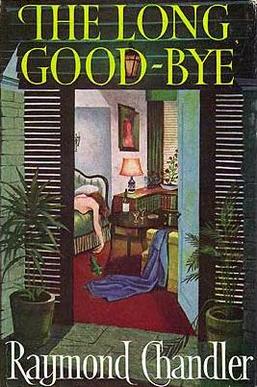Published in 1953, Raymond Chandler’s classic crime novel continues the adventures of private detective Philip Marlowe. Here, Marlowe befriends Terry Lennox, an emotionally and physically scarred drunk with a crumbling marriage. Lennox calls on him for a ride to the airport one night and Marlowe soon finds himself in the thick of a murder investigation. Not one to stay out of trouble for long, he soon becomes entangled with another alcoholic – the writer Roger Wade – and his attractive wife. It isn’t long before Marlowe suspects Lennox and Wade had more in common than a drinking problem.
Hardboiled detective fiction, of which Chandler was a chief purveyor, is a veritable minefield of tropes, types and clichés. Femme fatales, crooked cops, menacing gangsters, caricatured ethnic sidekicks and gratuitous cigarette smoke are but a few staples and they all show up in The Long Goodbye. The familiarity of these elements begs a question: is a mystery with so little mystery still worth reading?
The answer, in the case of The Long Goodbye, is a resounding “yes.” Though crime novels are by necessity plot driven, Chandler does a great job with characterization. You can see the stock origins of a lot of the minor players (the servant Candy in particular), but the main characters are fairly well-developed. Unlike his contemporary Sam Spade (unbelievably and effortlessly slick), Marlowe is complex and thoroughly human. He talks and acts tough, but he is also subject to injury, inadequacy and doubt. Similarly, Lennox and both Wades walk a morally ambiguous line in that they are devoid of neither sympathy nor malice.
Chandler also succeeds at sustaining tension. The Long Goodbye weighs in at 316 pages, but is remarkably taut with very little filler. It takes several pages to establish its narrative footing and it ends on a rather abrupt note, but everything in between is expertly paced. The prose is surprisingly crisp too – descriptions are neither purple nor threadbare.
Though sex-and-murder laden, The Long Goodbye is not the literary equivalent of a popcorn movie. Chandler uses Marlowe and Co. to explore the nature of power, truth and corruption and he does it without making us feel like we’re being lectured. There are a few places where Marlowe comes off as annoyingly self-righteous in his quest to defend Lennox’s good name, but if he didn’t believe so thoroughly in what he was doing, we probably wouldn’t care enough to read about it.
In the 50-plus years since its publication, The Long Goodbye has been the subject of parody, reinvention and critical acclaim (or, in the case of Robert Altman’s 1973 film adaptation, all three at once). It is, however, a book which can stand ably on its own two feet regardless of the printing date or the mythic reputation of the author.
8/10

No comments:
Post a Comment